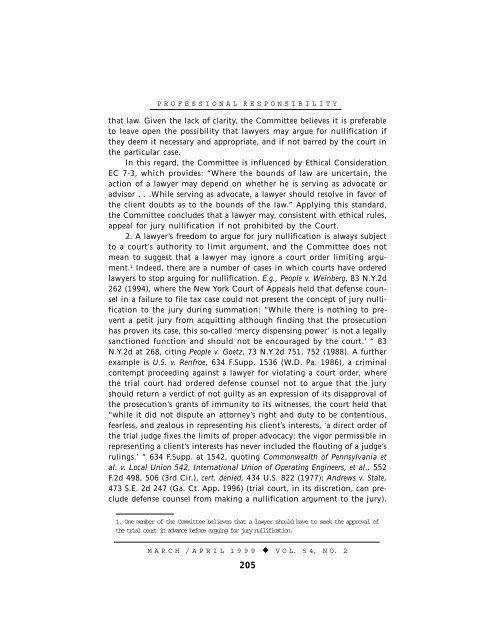THE RECORD - New York City Bar Association
THE RECORD - New York City Bar Association
THE RECORD - New York City Bar Association
You also want an ePaper? Increase the reach of your titles
YUMPU automatically turns print PDFs into web optimized ePapers that Google loves.
P R O F E S S I O N A L R E S P O N S I B I L I T Y<br />
that law. Given the lack of clarity, the Committee believes it is preferable<br />
to leave open the possibility that lawyers may argue for nullification if<br />
they deem it necessary and appropriate, and if not barred by the court in<br />
the particular case.<br />
In this regard, the Committee is influenced by Ethical Consideration<br />
EC 7-3, which provides: “Where the bounds of law are uncertain, the<br />
action of a lawyer may depend on whether he is serving as advocate or<br />
advisor . . .While serving as advocate, a lawyer should resolve in favor of<br />
the client doubts as to the bounds of the law.” Applying this standard,<br />
the Committee concludes that a lawyer may, consistent with ethical rules,<br />
appeal for jury nullification if not prohibited by the Court.<br />
2. A lawyer’s freedom to argue for jury nullification is always subject<br />
to a court’s authority to limit argument, and the Committee does not<br />
mean to suggest that a lawyer may ignore a court order limiting argument.<br />
1 Indeed, there are a number of cases in which courts have ordered<br />
lawyers to stop arguing for nullification. E.g., People v. Weinberg, 83 N.Y.2d<br />
262 (1994), where the <strong>New</strong> <strong>York</strong> Court of Appeals held that defense counsel<br />
in a failure to file tax case could not present the concept of jury nullification<br />
to the jury during summation: “While there is nothing to prevent<br />
a petit jury from acquitting although finding that the prosecution<br />
has proven its case, this so-called ‘mercy dispensing power’ is not a legally<br />
sanctioned function and should not be encouraged by the court.’ “ 83<br />
N.Y.2d at 268, citing People v. Goetz, 73 N.Y.2d 751, 752 (1988). A further<br />
example is U.S. v. Renfroe, 634 F.Supp. 1536 (W.D. Pa. 1986), a criminal<br />
contempt proceeding against a lawyer for violating a court order, where<br />
the trial court had ordered defense counsel not to argue that the jury<br />
should return a verdict of not guilty as an expression of its disapproval of<br />
the prosecution’s grants of immunity to its witnesses, the court held that<br />
“while it did not dispute an attorney’s right and duty to be contentious,<br />
fearless, and zealous in representing his client’s interests, ‘a direct order of<br />
the trial judge fixes the limits of proper advocacy; the vigor permissible in<br />
representing a client’s interests has never included the flouting of a judge’s<br />
rulings.’ “ 634 F.Supp. at 1542, quoting Commonwealth of Pennsylvania et<br />
al. v. Local Union 542, International Union of Operating Engineers, et al., 552<br />
F.2d 498, 506 (3rd Cir.), cert. denied, 434 U.S. 822 (1977); Andrews v. State,<br />
473 S.E. 2d 247 (Ga. Ct. App. 1996) (trial court, in its discretion, can preclude<br />
defense counsel from making a nullification argument to the jury).<br />
1. One member of the Committee believes that a lawyer should have to seek the approval of<br />
the trial court in advance before arguing for jury nullification.<br />
M A R C H / A P R I L 1 9 9 9 ◆ V O L. 5 4, N O. 2<br />
205

















